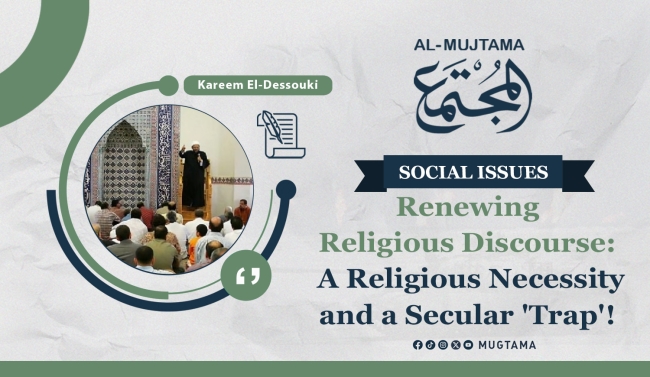Renewing Religious Discourse: A Religious Necessity and a Secular 'Trap'!
The concept of "renewing the religious discourse" has never been foreign to Muslims since the Prophetic era. It has always been tied to the teachings of Islam itself, considering renewal as a periodic necessity to remove misunderstandings and false beliefs that people mistakenly attribute to the religion. This is affirmed by the saying of the Prophet (peace be upon him): "At the beginning of every century God will send one who will renew its religion for this people" (Narrated by Abu Dawood). However, the media and political manipulation of the call for renewal in our time demands caution against traps that many may fall into due to the lack of proper religious grounding.
The Prophetic hadith lays the foundation for the idea that Islam, as a religion suitable for every time and place, requires renewal in understanding the texts to align with the developments of the time without compromising the fundamentals of faith and law. Meanwhile, advocates of misleading renewal aim to dismantle religious foundations under the guise of modernity or enlightenment.
The Quran teaches us that one of Satan’s repeated tactics in beautifying falsehood is propaganda, by giving falsehood names that obscure its reality. For instance, the forbidden tree in Satan's whisper to Adam (peace be upon him) was labeled as the "tree of eternity," and the forbidden wine in the Quran is marketed as "spirits" by those propagating misguidance. Thus, the prohibited becomes permissible, and falsehood is presented as truth to those lacking intellectual fortification.
Renewal in Islam is a jurisprudential process, as defined by the Prophetic tradition. It aims to clarify religious concepts in a way that aligns with the changing circumstances of time and place, seeking to apply Islamic principles to contemporary issues while preserving the essence and constants of Shariah. This involves adapting the application of Islamic texts to new realities, a process known in Islamic tradition as fiqh al-waqi' (understanding current realities).
In this context, any call for renewal that compromises the core principles is akin to Satan’s propaganda for a new "tree of eternity." Conversely, ijtihad (independent reasoning), recognized by scholars as a form of renewal, entails exerting effort to derive Shariah rulings from its sources (the Quran, Sunnah, consensus, and analogy) in ways that address new circumstances. This understanding has demonstrated, throughout history, how Islam has consistently been capable of renewal and adaptation to civilizational transformations.
In the era of globalization and technological and media developments, societies have become increasingly interconnected, with ideas traveling instantly. This imposes upon Muslims the challenge of addressing new issues that require Shariah-based responses, such as women’s rights, democracy, and personal freedoms. These are not merely local concerns but global topics that demand a religious discourse combining authenticity and modernity, guided by scholars.
Regrettably, the current reality indicates a significant shortfall in this area, allowing secular renewal propaganda to exploit the vacuum created by the failure of traditional religious discourse to address contemporary developments or real-world demands. This aligns with the warning of Sultan al-Ulama, Al-Izz ibn Abd al-Salam (may Allah have mercy on him), who said: "Whoever resides in a village where usury is widespread and preaches about adultery has betrayed Allah and His Messenger!"
Essential Guidelines
How can we regulate the process of renewal to safeguard religion from deviation while enabling it to address contemporary challenges? The first guideline involves distinguishing between fixed and variable aspects in the meanings of Shariah texts, whether related to creed, acts of worship, or transactions. The fixed principles cannot be subject to ijtihad under the pretense of renewal, as they are definitive in their authenticity and meaning. The Quran commands adherence to these principles: “So adhere to that which is revealed to you. Indeed, you are on a straight path.” [Az-Zukhruf: 43]
These texts form the muhkamat (clear and decisive verses) of the Quran, which constitute the foundation upon which any renewal in other matters should be based. Renewal must be rooted in the scholarly effort of those firmly grounded in knowledge, not individuals lacking expertise or promoting deviant opinions that contradict the consensus of the Ummah.
Here lies the role of religious and jurisprudential institutions in unifying perspectives and avoiding the state of jurisprudential chaos targeted by secular renewal propaganda. This unity brings the texts back to the objectives of Shariah, which aim to achieve benefits and avert harm.
If renewal seeks to achieve jurisprudential benefits without transgressing the boundaries of Shariah, it strikes the necessary balance between adhering to fundamentals and responding to changing circumstances. In light of this, it can be said that renewing the religious discourse is both a religious necessity and a secular trap.
The modernist discourse seeks to secularize religion, reducing its role in public life and confining it to personal matters by distorting the meanings of its texts. Thus, renewal becomes a pretext to dismantle the religion from within, under the guise of enlightenment. This is merely another "tree of eternity" that involves falsifying the religion.
The matter, therefore, hinges on the ability to strike a balance between preserving our religious identity and responding to the demands of the times. Renewal, from this perspective, is essential, provided it is conducted by qualified individuals and adheres to clear guidelines that protect the religion from deviation and ensure its continuity as a comprehensive way of life suitable for every time and place. Allah says: “And, [moreover], this is My path, which is straight, so follow it; and do not follow [other] ways, for you will be separated from His way.” [Al-An’am: 153]
Renewal that stems from a correct understanding of Shariah and aligns with its objectives is Allah's way of ensuring that Islam remains a living and civilizational religion. In contrast, renewal aimed at pleasing external forces or secular ideologies signifies a loss of identity. Muslims must remain vigilant against attempts to distort their religion with glittering "trees of eternity."
-------------------------------------------------------------


